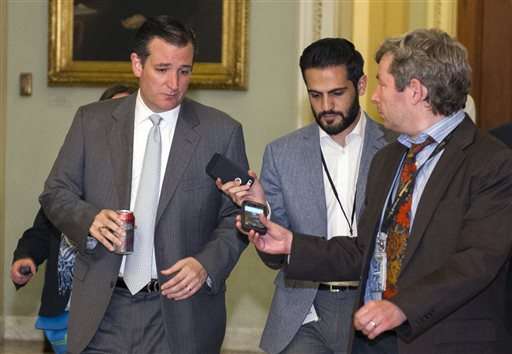Senate takes up House bill but fails to avoid spying lapse (Update)

For the first time since Sept. 11, 2001, the Congress curtailed the National Security Agency's authority to track suspected terrorists as lawmakers struggled to restore approval for mass collection of phone records and other surveillance methods.
No solution was likely before Tuesday at the earliest, and the Republican lawmaker who triggered the gridlock took credit in a message to supporters that also sought donations to his presidential campaign.
"Yesterday, I forced the expiration of the NSA's illegal spying program. Contribute $5 now to show your support," tweeted Sen. Rand Paul of Kentucky.
While Paul sought to capitalize on his position, House-passed legislation was stalled in the Senate, where Majority Leader Mitch McConnell and other leading Republicans sought changes.
A senior member of the House GOP leadership, Rep. Kevin McCarthy of California, said the best course would be for the Senate to approve the measure as written. But he pointedly did not rule out revisions. "I don't know what the Senate could do. They said a lot of things," he told reporters.
The lapse in authority affected not only the NSA's ability to collect mass phone records. It also meant at least a temporary end to the FBI's authority to gather business records in terrorism and espionage investigations, and to more easily eavesdrop on a suspect who is discarding cellphones to avoid surveillance.
"We call on the Senate to ensure this irresponsible lapse in authorities is as short-lived as possible," White House spokesman Josh Earnest said in a statement issued Sunday night.
The House-passed bill, which President Barack Obama supports, would alter the bulk collection program so that phone companies, rather than the NSA, would collect the records after a six-month transition period. The agency would be authorized to search the material, but only with permission from the courts.
Attempts to approve a renewal of authority failed late Sunday, thwarted by Paul.
"This is what we fought the Revolution over, are we going to so blithely give up our freedom? ... I'm not going to take it anymore," he said. Supporters wearing red "Stand With Rand" T-shirts packed the spectator gallery.
Paul's actions angered fellow Republicans, who watched helplessly as anti-terrorism authority lapsed only four months after they took control of the Senate.
Sen. John McCain, R-Ariz. complained to reporters that Paul places "a higher priority on his fundraising and his ambitions than on the security of the nation."
And Rep. Adam Schiff of California, the senior Democrat on the House intelligence committee, issued a statement that said: "Having gone past the brink, the Senate must now embrace the necessity of acting responsibly."
The high-stakes drama played out as Congress debated significant changes prompted by the disclosures of Edward Snowden, the former NSA contractor who revealed the phone records collection and other main surveillance programs.
While intelligence officials publicly warned of danger, they said they were not deeply concerned with a lapse of a few days or weeks, given that the authorities remain available in pending investigations. What they most fear is a legislative impasse that could doom the programs permanently.
Obama supports the USA Freedom Act, which ends NSA bulk collection of U.S. phone records but allows the agency to search records held by the phone companies. That bill, which preserves the other expiring provisions, passed the House overwhelmingly May 13.
Senate Republicans blocked that legislation on May 23, arguing that it undercut the NSA's ability to quickly search the records. It fell three votes short of the 60 needed to advance.
But with no other options, Senate Majority Leader Mitch McConnell, in an about-face, reluctantly embraced the House-passed bill Sunday night.
"It's not ideal but, along with votes on some modest amendments that attempt to ensure the program can actually work as promised, it's now the only realistic way forward," McConnell said.
© 2015 The Associated Press. All rights reserved.

















